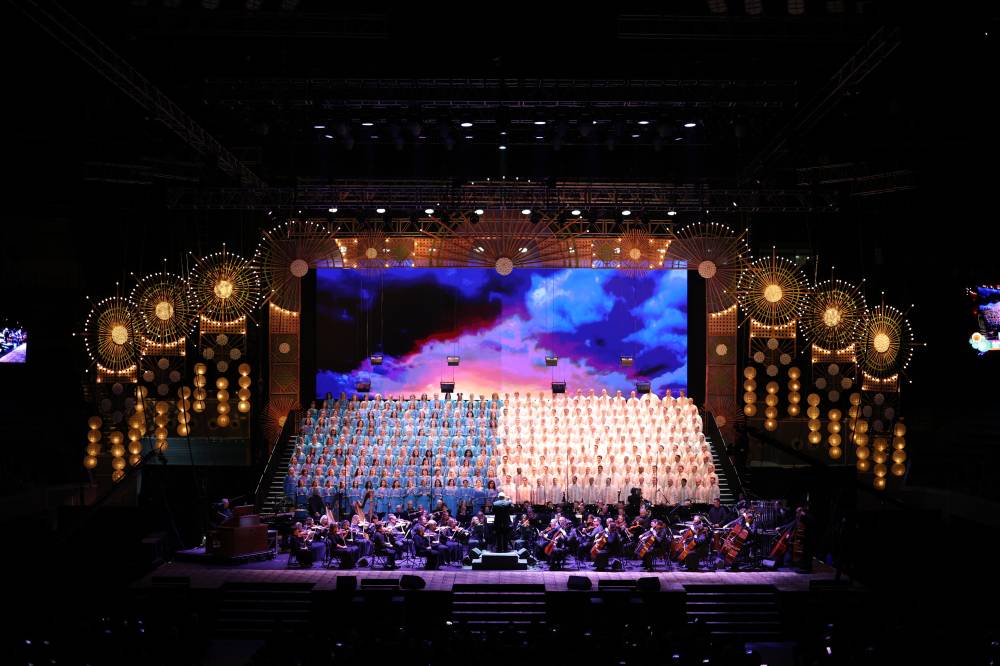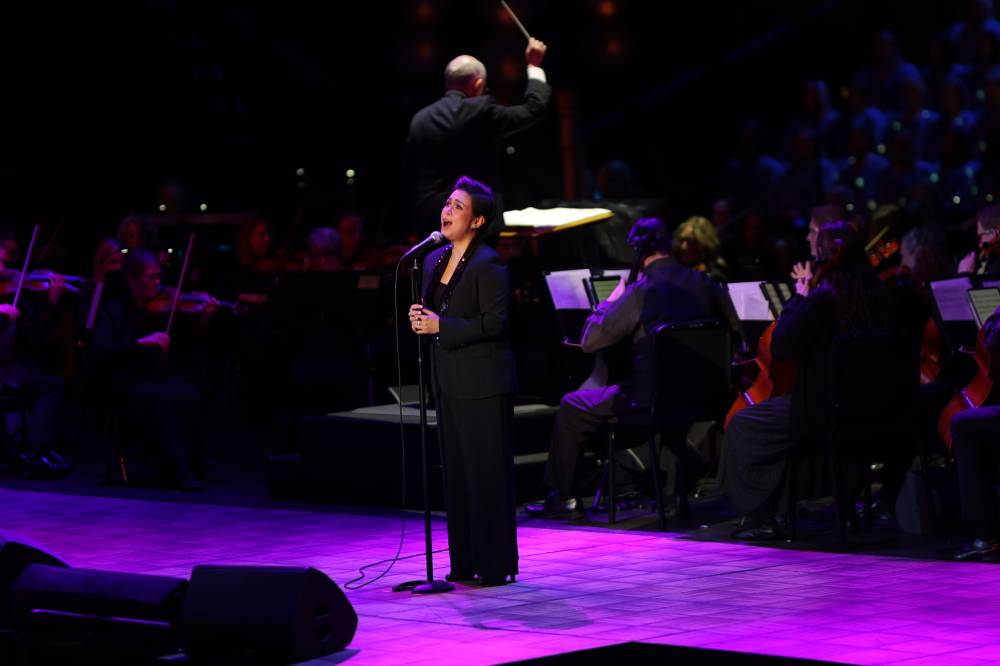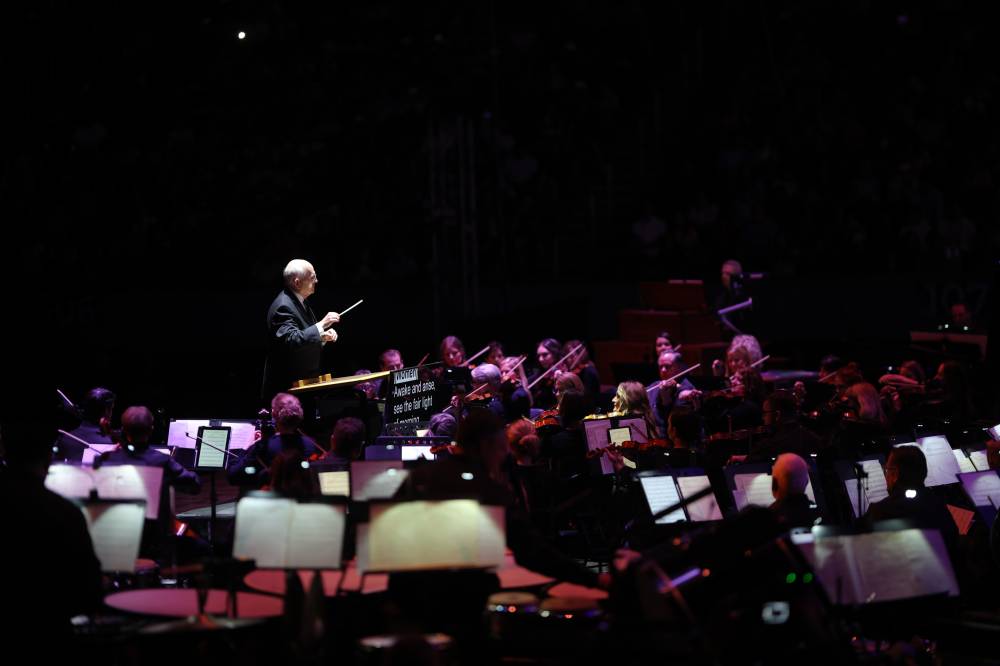The Tabernacle Choir at Temple Square wows Manila audience

The Tabernacle Choir at Temple Square’s recent debut performance took Manila’s music lovers by storm.
The concert was held at the Mall of Asia Arena, which was practically was filled to capacity. Billed “Himig ng Pagasa (Melody of Hope),” the performance was part of the choir’s “Hope” world tour, Manila being its second stop.
Lea Salonga, one of the country’s finest singers, graced the concert with two moving songs. Ysabelle Cuevas, also a celebrated singer/songwriter, together with some selected performers, likewise graced the concert. The tandem of Suzi Entrata-Abrera and Paolo Abrera hosted the concert.

Starting on time, the concert began with the audience being greeted by the choir, numbering more than 300 members, and some 70 musicians who comprised the symphony orchestra as they went to their respective positions. The women wore elegant aquamarine kimona, matched by the men’s debonair white barong Tagalog.
Soaring music
Mack J. Wilberg, the choir’s conductor and music director, stood on the podium and hushed the audience into silence as the choir and orchestra sounded the majesty of “Praise the Lord, Almighty,” underscoring the theme of the section “Hymn of Praise.” The music soared, made more majestic with the sound of handbells (rarely seen in any local choral concert) played by some of the choristers themselves.

In Caccini’s “Alleluia,” both choir and orchestra essayed convincing tonal dynamics from soft to loud. The manner with which the piece was arranged effectively conveyed a convincing challenge that the choir and the orchestra gloriously surmounted.
Credit goes to the choir’s director and conductor, Dr. Wilberg, who had arranged practically all of the pieces that the choir and the orchestra rendered. This venerable maestro showed his outstanding métier in fashioning the works in such a manner as to effectively project that keen sense of spirituality. Such a feat moved the listeners to savor the music intently, and strike a prayerful oneness with the ensemble.
Truly, music is a dynamic, effective way of praying, of communicating with the Almighty.
“Songs of the World” followed, underscoring the value of “Hope.” In this section, a Spanish wedding song, “Ah, el novio no quere dinero,” and “Betelehemu,” a Nigerian carol, were sung. The songs brought home the glorious themes of life as in the case of the first song, and love in the succeeding song. The carol exuded a festive mood as some males played percussion instruments that enlivened the singing. This was complemented by the choristers’ side movements, as well.
This prompted the hosts to talk about Christmas. Paolo recalled that he and Suzi were invited to visit the Tabernacle Choir last December at the Temple Square in Salt Lake City, Utah. They witnessed the choir’s performance at the Conference Center, where the commanding Schoenstein organ can be found, which served as the choir’s background. A short clip on the visit was shown on the screen.
Impassioned applause
Suzi was prompted to say that the Filipinos are “Christmas people,” and expressed the hope that the tabernacle choir would come back and give a Christmas concert.
“Songs of the Land” followed, which featured three American songs such as “Music Everywhere,” “Pilgrim Song” and “Cindy,” that the audience ardently appreciated.
Salonga’s entrance was greeted with impassioned applause. She rendered two songs under the theme “Songs of the People.”
She gave brief remarks as she introduced the songs. In the first, “The Story Goes On,” from David Shire’s “Baby,” as arranged by Wilberg, Salonga acknowledged the applause with a warm smile and said, “It’s nice to be home, and great to be with The Tabernacle Choir once more.” She had guested in the choir’s concert in December of 2022. She prefaced the song by saying how important it was to be a mother, saying that no work or accomplishment means more to her than being a mother.
In a fresh, well-modulated voice, she rendered the song with elan, showing how much at home she was with the Broadway musical.
She was at home, too, in the next song, a Jose Mari Chan opus, “Hahanapin Ko” with lyrics by Jimmy Santiago, and arranged by her brother, Gerard Salonga. Briefly she prefaced the song by saying that Filipinos are global, as they work to earn a living, showing kindness, optimism and hope to make other peoples’ lives better.
The song, she further said, captures that nostalgic feeling when they go abroad to earn a living, including her when she fulfills her musical engagements abroad. Dedicating the song to overseas Filipino workers, she sang with utmost sincerity and feeling, moving an audience in complete silence, who burst into thunderous applause at the end. —contributed INQ

















